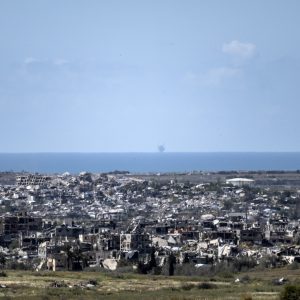Confronting Islamophobia is necessary to achieve justice and human rights for Palestinians
By Taha Ghayyur (Executive Director, Justice For All Canada)
Dehumanization, which paves the way for hate and persecution, is a distressing tactic employed by various states to strip certain groups of their inherent human qualities, identity, and dignity. This process not only facilitates but also justifies the systematic persecution of these groups.
Muslims, in particular, have been victims of such strategies in numerous countries, each scenario tinged with its unique complexities yet united by the underlying current of Islamophobia.
In China’s Xinjiang region, the Uighur Muslims endure severe persecution, with the Chinese government employing dehumanization tactics that paint Uighurs as extremists to legitimize the mass detentions in so-called “re-education camps,” notorious for human rights abuses. The plight of the Rohingya Muslims in Myanmar represents one of the most harrowing examples of dehumanization, where they are denied citizenship and depicted as illegal threats to Buddhist culture, justifying severe violence and mass displacement. Both China and Myanmar’s actions have met the threshold for genocide.
India’s actions are fueled by a potent mix of political rhetoric and policies steeped in Hindutva ideology, leading to Muslims being portrayed as “outsiders.” This narrative emboldens far-right groups and fosters an environment ripe for discrimination. Meanwhile, in France, the issue revolves around secularism and integration, with public discourse often unfairly casting Muslims as resistant to integration, sometimes even associating them with extremism.
However, the root of these issues lies in deep-seated Islamophobia, a phenomenon acknowledged by the United Nations as stemming from institutional, ideological, political, and religious hostility, which manifests as structural and cultural racism targeting Muslim symbols and markers. This recognition has led to the designation of March 15th as the International Day to Combat Islamophobia, a day to reflect on the global conflicts fueled by such prejudices.
The recent escalation of violence against Palestinians by Israel as part of “Operation Swords of Iron” has led to the tragic killing of over 30,000 Palestinian lives, with more than 72,000 injured. This war on Palestinians in Gaza and the West Bank is deeply intertwined with Islamophobia and anti-Palestinian racism. The Israeli government’s actions, driven by ingrained prejudices, have dehumanized Palestinians in order to justify the mass killing of civilians. Statements by prominent Israeli figures, casting the conflict in terms of light versus darkness or humanity against barbarism, reveal a disturbing narrative.
In recent months, the world has witnessed a dramatic escalation in violence against Palestinians in Gaza and the West Bank, a continuation of decades-long persecution by the Israeli government. The severity of the situation has led to a growing consensus among international human rights experts and organizations that what we are witnessing could amount to genocide. The evidence suggests that the actions taken by Israel in its military campaign against Palestinians meet the criteria for genocide, as outlined in the Genocide Convention. This is a grave accusation, one that the international community cannot ignore. The International Court of Justice’s provisional order acknowledging a plausible genocide in the Gaza Strip further underscores the urgency of the matter.
It is crucial to understand that the argument of self-defense, often cited by some in justification of Israel’s military actions, cannot excuse acts of genocide. International law is clear on this matter: there is no right to self-defense against a territory under occupation. Moreover, self-defense is never a justification for genocide. This principle is vital in ensuring that the protection of human rights takes precedence over geopolitical strategies and national security narratives.
The human rights abuses extend beyond the immediate violence. The collective punishment of Palestinian civilians, the forced relocation of populations, and the use of prohibited weapons in densely populated areas are all indicative of a disregard for international humanitarian law. These actions raise serious concerns about war crimes and crimes against humanity, further complicating an already dire humanitarian crisis.
Justice For All Canada has documented an in-depth report, “Palestine Genocide, Apartheid, and Occupation: Islamophobia and Anti-Palestinian Racism are Leading to the Persecution and Genocide of Palestinians,” that details a 76-year-long reality marked by the systematic persecution of Palestinians through mass killings, displacement, military occupation, and a discriminatory legal regime. The report outlines the growing consensus that what is happening in Palestine is a genocide, and how this is linked to Islamophobia and Anti-Palestinian racism.
The report demonstrates how the international community’s failure to act decisively in the face of these atrocities has only emboldened those who perpetrate them. The lack of meaningful consequences for such egregious violations of international law sends a dangerous message that such actions can be carried out with impunity.
The United Nations’ Day to Combat Islamophobia is a reminder of our collective responsibility to combat Islamophobia. It is not just about acknowledging the widespread prejudices that lead to dehumanization, hate and persecution; it’s about actively working to dismantle these harmful ideologies. In this context, Canada, along with the rest of the international community, must recognize its role in holding Israel accountable for its part in fueling hate, not only within its own population but also around the globe.
The fight against Islamophobia and the quest for justice in Palestine are intrinsically linked. By confronting the former, we pave the way for a more equitable resolution to the latter, ensuring that the principles of justice, human rights, and international law are upheld.
The responsibility to prevent and punish the crime of genocide is not just a moral obligation but a legal one, enshrined in the Genocide Convention and customary international law. The international community, including Canada, must take immediate and effective action to address this crisis. This is not just about Palestine and Israel; it is about upholding the principles of justice, human rights, and international law that form the bedrock of the international order.
As United Nations experts have warned, the failure to mobilize against the risk of genocide against Palestinians represents a profound concern for the international system’s credibility and effectiveness. The time for action is now. The world must come together to prevent further loss of life and to ensure that those responsible for these crimes are held accountable. Only then can we hope to break the cycle of violence and repression that has plagued this region for too long.
Taha Ghayyur is the executive director of Justice for All Canada, a non-profit human rights and advocacy organization dedicated to preventing genocide.













